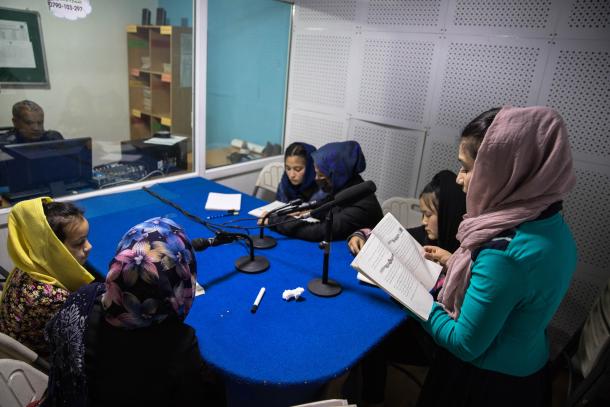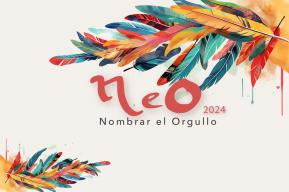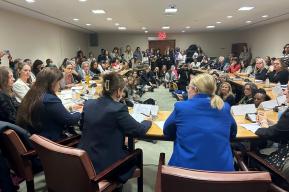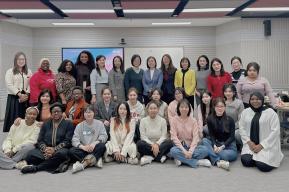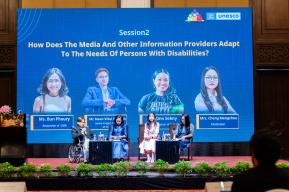Article
Radios in Afghanistan are giving a voice to women and local communities
In Afghanistan, Radio is the main source of information for many people across the country. Through the EU-funded project “Support to Afghan Media Resilience to Foster Peace and Security”, UNESCO is supporting 28 regional and local Radio stations that play a central role in providing humanitarian and educational content to local communities across the country. Over the past 14 months, the project has supported around 1000 radio programmes and public interest reports, that have reached an estimated 17 million citizens across the country.
On the occasion of World Radio Day, UNESCO presents some the work of some of its project partners they are doing to ensure that Afghan citizens have access to critical, lifesaving information.
Ensuring access to information after the Herat earthquake:
Following the devastating earthquakes that hit Herat province in October 2024, UNESCO’s Partner, the Killid Group, which is amongst the largest radio networks in Afghanistan, immediately deployed three mobile radio sets to the most affected regions. This allowed the radio to start broadcasting from areas such as Zendajan, Gulraan and Robat Sangi, in large parts destroyed by the earthquake within days of the earthquakes, and to disseminate lifesaving humanitarian information, including on the humanitarian aid assistance available to the population. The content, which included interviews with local populations, public service announcements on humanitarian aid or field interviews, reached a local population of around 30,000 people and was also broadcasted nationally.
The mobile radio stations have become more than a broadcast medium; they have become a platform for the voices of the local population. Through live programs, roundtable discussions, and special interviews, these stations have provided a space for community members to express their concerns, share their stories, and voice their opinions. This approach has not only created a sense of inclusivity but has also empowered individuals to actively participate in the recovery process.
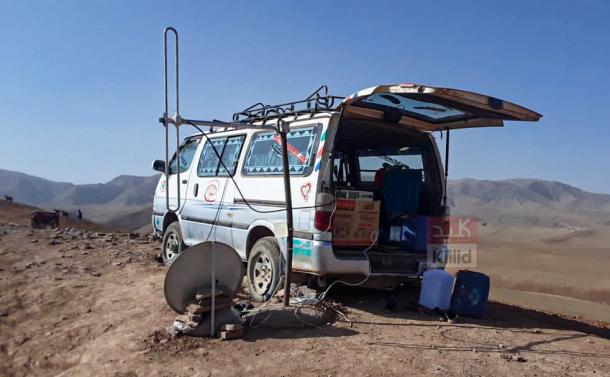
Local community radio “Muska Radio” provides job opportunities for women journalists in Helmand province:
Helmand province in the south of Afghanistan is one of the most restrictive places for women journalists in the country. In March 2022, according to a UNESCO-supported survey, there were no female media workers able to work. Muska Women’s Radio Station, located in Lashkar Gah, Helmand, is an independent radio station that commenced its broadcasts in December 2008, and the only radio in the province dedicated to serving a female audience and their families. All aspects of the station's operations, whether technical or production-related, are skillfully managed by its dedicated team of female journalists. This radio station was launched in response to the enduring conflict and the pressing need to ensure women's access to information, fostering awareness of socio-economic, political, and cultural matters. Additionally, it seeks to bolster women's involvement in media and public discourse. Following the takeover by the de facto authorities and due to financial challenges, Muska had to cease its operations in August 2021. With support of the EU-funded project “Support to Afghan Media Resilience to Foster Peace and Security”, Radio Muska was able to resume its broadcasting, which covers topics such as education, culture or news. As the staff of Muska put it: “The support of this project enabled Radio Muska to resume its operations. This news brought not only joy and happiness to the Muska staff but also to the female population of Helmand. It was a sign that they were not alone in these challenging times, and some organizations and individuals believed in their cause and stood by their side in these difficult times. The resumption of Muska's operations brought a renewed sense of hope and gratitude and serve as a reminder that no matter the challenges faced, with the right support and determination, positive change is possible.
Radio Muska has been able to provide job opportunities for ten women journalists, allowing them to continue or restart their profession. With many of the female media workers in Afghanistan being the sole breadwinners of their families, ensuring a basic income becomes of existential importance not just for the women journalists themselves, but entire families.
Radio Begum – A lifeline of hope for girls that have been banned from school
Radio Begum provides educational broadcasting, on-air-schooling, mental health support and financial literacy classes to Afghan women and girls, reaching an audience of around 5.9 million in 19 provinces, 63% of whom are women and girls. With Afghan girls having been out of school for over two years, women being banned from working in many sectors, and often being confined to the house, the psychological impact and trauma on an entire generation is increasingly felt. Following the ban on women working for NGOs and the UN, Radio Begum recorded an increase in the call-in programs providing psychosocial advice by 33%, and later by 156% as a result of the antenna extensions. Their psychological programming is the most listened show of the station – a sad testament to the mental health crises facing women in Afghanistan, with 90% stating their mental health was bad or very bad, according to a recent UN Women survey.[1] One listener shared the following story of Fatima, a 15-year-old girl who has been blind since birth and is a beneficiary of the Informal Education Classes aired by Radio begum:
Because there are no facilities for her to attend school or get educated in her province, she remained illiterate. She and her elder brother, who is also blind used to listen to Radio BBC before Begum. But once she discovered Radio Begum, she never misses a program. She feels included in society after talking to the presenters of Radio Begum because they are all girls. She dreams to share her experience with people as a presenter of Radio someday but right now, she feels motivated to receive all the information about authors, poets, different health issues as well as psychological issues through the radio. She says she might never get a chance to attend a blind school or learn how to write but being able to get educated through the radio is a great asset for her, for which she is grateful. She says that Radio Begum is like a school and the presenter are like friends to her.
